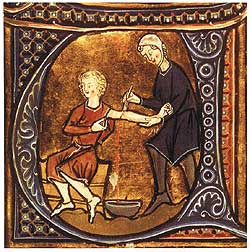Leechcraft

There is something hideously fascinating about war news. The last week has given us a new one to follow--new geography to learn, "Ossetiya," new experts to hear from, and new smoke-shrouded, rubble-strewn streets to sorrow over. As long as there have been historians, they have attempted to explain why wars start, why they end--but they can't have gotten it right, else war would long ago have been done away with.
It's my theory that we don't have a theory. What if war is a disease that societies catch, and we are living in the era before germ theory? It could be evil spirits, we'd say, or unbalanced humors, or invisible miasmas that waft from battlefield to battlefield. When I listen to the pundits talk about war, what they tell me sounds like medieval pharmacopeia. Judging from the results, it's equally efficacious. Bleeding, as I recall, was one of the favored therapies.

